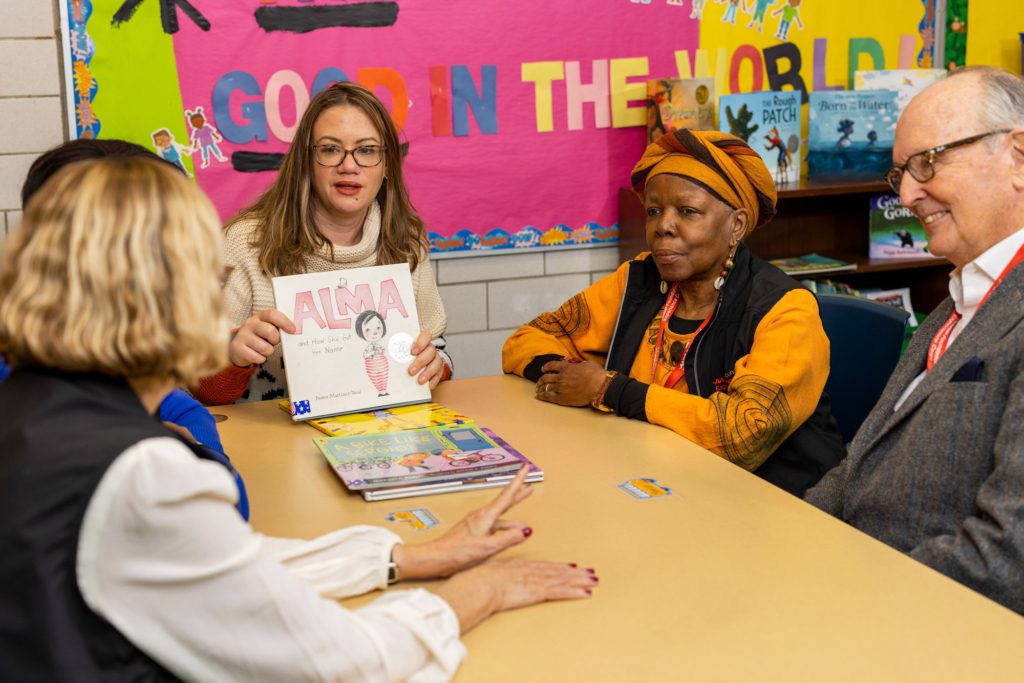AARP Foundation, an Independent Sector member, creates and advances effective solutions to reduce poverty for and with older adults. The Foundation fights systemic injustice and helps older adults with low income seize opportunities to re-enter the workforce, bolster their budgets, give back to their communities, and recover from disasters.
AARP Foundation helps younger people, too. Its Experience Corps (EC) program empowers people over 50 to tutor and help students become better readers by the end of third grade. We asked Mioshi Moses, Vice President of AARP Foundation Experience Corps, about AARP Foundation’s work in general, with a specific focus on Experience Corps.
IS: AARP Foundation aspires to achieve a future without senior poverty. Tell us about how Experience Corps contributes to this important work to create economic opportunity and social connections for seniors — and why both are important.
MM: Our volunteers consistently say that they get as much out of our program as do the children and the schools we serve. Experience Corps tutors receive extensive training in technology, literacy education, and social emotional learning, and they build skill sets they can use outside their volunteer roles. This is true, in fact, for most of our tutors, who do not come from educational backgrounds and are thrilled to develop new talents to use in their lives. We see this in our data, with more than half of EC tutors committing to additional volunteer roles, 16% starting a new job, and 39% exploring more opportunities by taking classes or participating in other educational programs.
We also see an impact in the social connectedness of our tutors, with 84% stating that their lives have improved for the better by virtue of volunteering with Experience Corps. Tutors get to meet their peers in their own community and develop longstanding ties with educators and administrators who serve alongside them, and, of course, with students. Through our national network, AARP Foundation Experience Corps also allows tutors to connect with volunteers across the country via workshops and our annual national meeting.
We know that when older adults are more connected, their mental and physical well-being improves. Consistent, long-term volunteering, such as Experience Corps, is a game changer for our tutors’ social, physical, and emotional health.
IS: You have a three-pronged approach to your work – helping students succeed, older adults thrive, and communities grow stronger. Can you briefly share how these approaches work together?
MM: Training older adults as tutors in our network increases their social connectivity, develops a range of soft skills, and improves health outcomes. When our volunteers provide consistent, research-based tutoring to K-3 students, we see measurable improvement in the children’s key literacy measures. We know that when students are reading at grade level, especially at that critical age range, they are more likely to achieve further academic success, graduate high school, and be more successful in living healthy, fulfilling, and economically sustainable lives.
By working in concert with educators, administrators, and families, our tutoring model also relieves the burden of strained education systems. Experience Corps tutors provide students with 1-on-1 practice time that they would not necessarily receive during normal instruction, while improving the classroom experience for all students. By providing both educational and mentoring support at a critical juncture in the lives of young children, our program helps to break the cycle of poverty, particularly in high-need communities where greater student support is needed.
The ability to boost engagement with older adults, boost academic performance in students, and help build more resilient schools and communities is why we call Experience Corps a “triple win.”
IS: Through your Experience Corps program, people over 50 tutor students to help them become better readers by the end of third grade. How did you decide to take on the additional goal of advancing reading, and helping people outside your target demographic?
MM: Experience Corps was originally an independent project developed in 1995 to promote healthy opportunities for older adults through volunteer service. Throughout its evolution, Experience Corps worked with multisector partners, including CoGenerate (formerly Encore), Johns Hopkins University, and the National Senior Service Corps, now a part of AmeriCorps Seniors. The program found its strength at the intersection of older adult volunteers’ rich experience and the nation’s commitment to some of our most high-need populations.
After partnering with AARP to recruit older volunteers from communities across the country, Experience Corps formally became a part of AARP in 2011 and then AARP Foundation in 2015. Through these mergers, AARP Foundation Experience Corps continues to increase its ability to tap into the experience and dedication of Americans 50 and over who want to give back to their communities, and the program in turn offers AARP a unique way to engage in service — through tutoring and mentoring.
We strongly believe that we can begin to break the cycle of poverty by helping students achieve grade-level reading, and, through strengthening connections in communities, we hope to reduce the number of older adults living with low income.
IS: How do you recruit seniors as tutors for the Experience Corps? What specific skills and experiences are they required to have?
MM: Experience Corps operates on a partner model, and our 20 program partners range from nonprofits to municipalities to community-based organizations who can tap into their own grassroots networks, connect with our national brand, and recruit volunteers who are passionate about making a change. We provide a measure of institutional support to our partners, helping them get earned media, build recruitment campaigns, and leverage the AARP Foundation name for impact.
And as part of AARP and AARP Foundation, we can also recruit through our national network of state offices and affiliates. Whether by appearing in AARP The Magazine, the nation’s most widely circulated publication, or connecting with AARP staff in all 50 states, we get in front of the largest group of older volunteers across the country.
There are no specific skills, backgrounds, or experiences our tutors need to have other than a passion for improving the lives of students and their communities. As I shared before, most of our tutors do not come from educational backgrounds, but usually, they do share a love of reading, learning, and supporting young people. In fact, it is our highly structured tutoring model, our carefully designed materials, and our scrupulous training that new recruits find most appealing about our program.
IS: Independent Sector focuses on building a healthy and equitable nation where all can thrive. Talk about the points of connection between our mission and yours, and how being an IS member helps you advance your mission.
MM: As a proud member of IS, our shared vision of working alongside the communities we serve is crucial. AARP Foundation Experience Corps is a program embedded in communities of volunteers, students, educators, and families working together for a brighter future. We also share a vision of equity. The Experience Corps model helps students break the cycle of poverty while providing older adults with a greater sense of fulfillment and expanded opportunities.
The IS community puts us in collaboration with nonprofits and foundations who share our commitments to a better future. The invaluable ties we’ve built with these partners are testaments to our common missions. We look forward to continuing to expand these connections and hope to hear from many IS partners and stakeholders about how we can do even more together. Become a part of our “triple win!”
Debra Rainey is Manager, Communications at Independent Sector.



